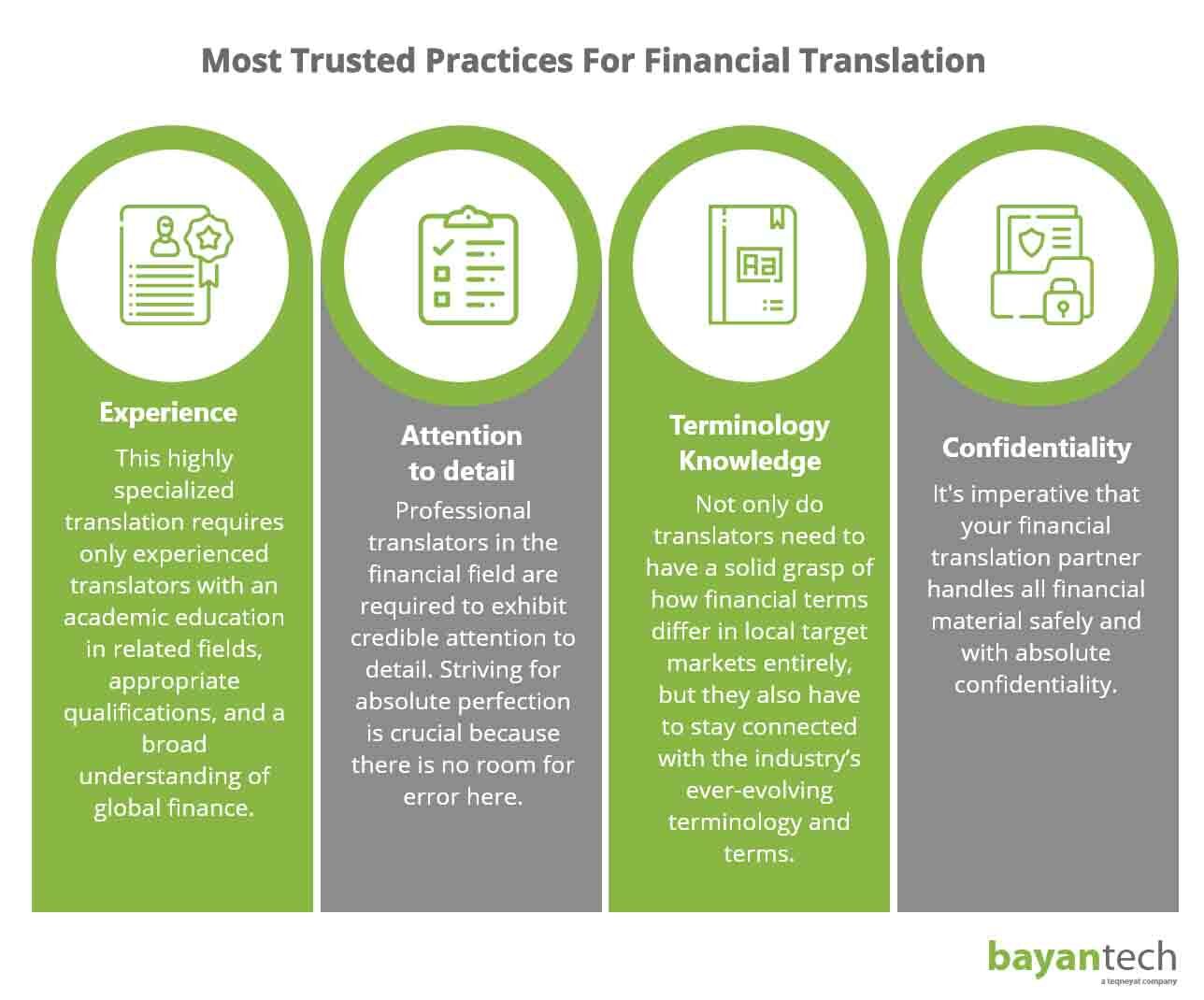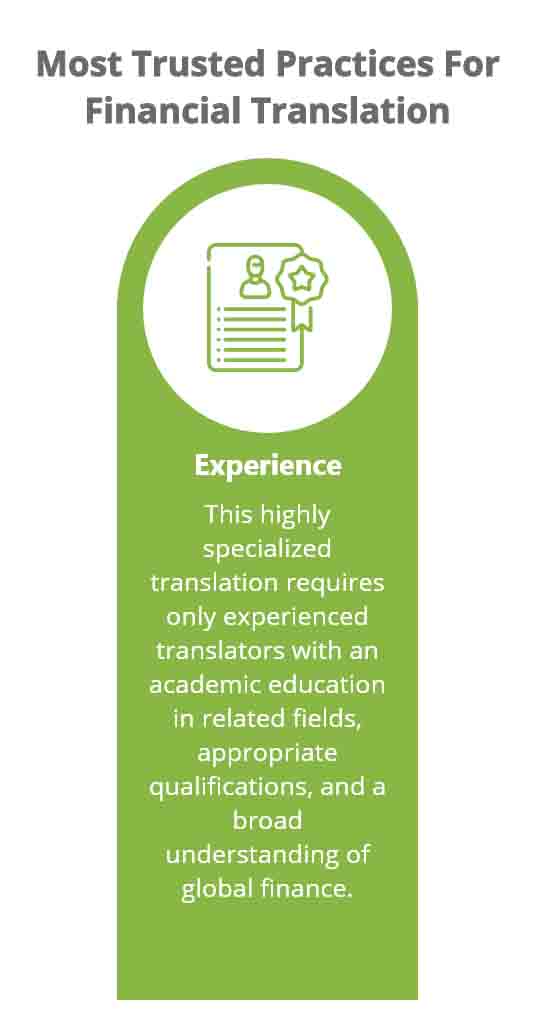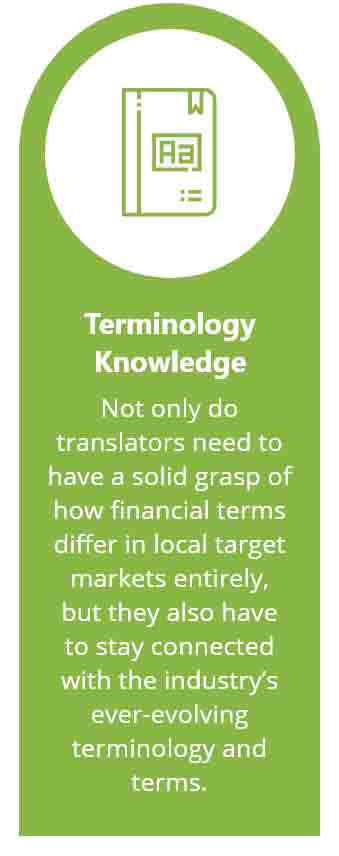One of the biggest and most important industries in the world, the financial industry, is expected to reach $26.5 trillion by 2022, based on the market figures, with Asia-Pacific ranking as the largest financial center globally and North America following right behind it.
With the colossal amount of money bound in global financial operations, there are high demands for accurate financial translations.

Financial Translation 101
Besides the fact that the financial sector is witnessing constant development, thanks to globalization and technological innovation, it’s also known for being one of the most tightly regulated industries. Local regulations, for instance, set by countries obligate international banks and multinational companies to craft immaculate multilingual documentation.
Enters financial translation.
Whether it’s business plans, financial agreements, income statements, balance sheets, tax reports, or documents related to insurance, financial translation refers to conveying all these and other types of financial documents from one language to another, where the main focus is to deliver clear, accurate, and effective communications, helping global companies and organizations run their international financial operations with ease.
It’s a highly specialized field of translation in regard to accuracy and timing. So, it’s impossible for anyone to work in this field without having the required experience, skill, and subject-matter expertise that are necessary to attend to the details inherent in this kind of translation and meet the sector’s demanding time requirements.
Challenges of Financial Translation
Even though English is considered the lingua franca or the language of the business world, the global market will expect people and businesses to operate and communicate in other different languages. That’s because many countries are still using their native languages as their operating languages, which will in that case call for high-quality financial translation services in less common and even rare languages that often aren’t most in demand.
Additionally, the scope of the global financial landscape is broad, and encompassing a wide range of activities and operations, such as international banking, investment, insurance, consumer finance, corporate finance, and more. An investment banker in Dubai needing to translate an M&A pitch book from Arabic into English is vastly different from a Kenya-based private banker needing annual income statements translated from English to Swahili. The key here is specialization. Relying on a translator with a financial background is good, but relying on a translator with a particular specialization in the financial field is even better for the quality of your translation.
Financial Document Types
The type of documents used in the financial industry adjusts based on location and sector. But here are some ubiquitous written communications managed and distributed throughout the industry:

Corporate Finance /
Investment Management
Bond & Equity
Prospectuses
Initial Public Offerings
Requests for Proposals
Compliance Training
Corporate Communications
Key Investor Information
Documents (KIIDs)
Financial Instruments
Fund Fact Sheets
Shareholder Reports
Annual Reports

Banking
Personal Loan
Evaluations
Loan Applications
Card Promotions
Educational Pieces
Store Signage
Compliance/OFAC
Documentation
Banking Website
ATM Prompts

Insurance
Financial Reporting
Accounting Policies
Security Documentation
Applicant Q&A Forms
Regulations and Compliance Governance
Life & Retirement
Property Casualty
Documentation
Claims
Insurance forms
Financial Terminology
Ever tried to read any kind of financial documents at least in your own language? It’s surely challenging.
That’s because financial terminology is unique, complex, and ever-burgeoning. Rendering financial terminology, however, is even more complex and requires impeccable levels of accuracy and consistency, since local regulations and financial terms are not universal. For example, Saudi Arabia has a financial term called ‘zakat.’ The term is an alms tax and used for religious, charitable purposes. It’s unique to the financial statements prepared in Saudi Arabia because Islamic law requires its citizens to pay it. And because terminology accuracy is the tenet of financial translation, you can’t entrust your financial translation projects to just anyone.
Exchange Rates Vary
Another challenge of financial translation is how economies and currency exchange rates vary. The currency most companies usually tend to operate with is the one from their nation’s headquarters. However, for international operations, companies opt for a different currency that’s usually relevant in the target markets. An expectation of translators is that they understand how one currency converts to the denomination of another, which is a process typically done for a company’s financial record keeping and is often used in balance sheets.
Cyber Security Requirements
Financial operations and money exchange across the web involve a lot of money and a huge amount of highly sensitive information. It’s no surprise then to learn that the financial industry is one of the top three industries that cybercriminals target.
It’s alarming. There’s just no substitute for data protection here, and when using financial translation, it’s paramount to ensure your documents’ secrecy since these documents contain names, dates, amounts of money, terms and conditions, and other private information. Also, financial translation services must maintain sensitive data’s exactness because mistakes may affect the banks’, investors’, or insurance providers’ credibility.
One more thing to consider when deciding to work with a language service provider is whether or not its financial translation services comply with each country’s data protection laws and local regulations. Because only then, you can be sure that they have the in-depth knowledge of the financial regulations and legal procedures necessary to deliver trustworthy and compliant financial translations.
Sign up to our newsletter to receive the latest blogs and news
Best- and Most Trusted - Practices for Financial Translation


1. Experience
These highly specialized sectors of banking, finance, and insurance require only experienced translators with an academic education in related fields, appropriate qualifications, and a broad understanding of global finance. We just can’t stress this enough. Plus, as we previously mentioned, the scope of the financial industry is broad, so it’s essential that financial translators specialize and work only in a specific niche area.

2. Attention to detail
Professional translators in the financial field are required to exhibit credible attention to detail. Since financial documents are riddled with vital numerical data and sensitive information, mistakes could cost businesses and companies money, or worse their reputation. If perfection is an illusion, in the financial industry, it can’t be. Striving for absolute perfection is crucial because there is no room for error here.

3. Terminology Knowledge
Not only do translators need to have a solid grasp of how financial terms differ in local target markets entirely, but they also have to stay connected with the industry’s ever-evolving terminology and terms, which are originated in part because of the continuous rise of new financial innovations such as digital payment methods, mobile banking technology, and more. For instance, Fintech, which means ‘financial technology’, went up by 82% from 2017 to 2018, and it’s expected to increase even more due to internet banking and cryptocurrency popularity.

4. Confidentiality





bayantech provides trustworthy translation services with the help of one of the largest teams of finance linguists and specialists who ensure complete accuracy, compliance with global and local regualtions, and confidentiality. Reach out for a financial translation quote today.
Translate Your Financial Documents with Accuracy, Speed, and Confidentiality.







